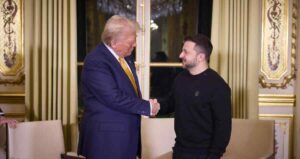Today, the US president promised to make a statement on Russia. It will, of course, be listened to with interest. But what, in essence, will change as a result?
The United States has once again — for the umpteenth time! — changed its policy on arms supplies to Ukraine. Yesterday they were supplying, today they are not, tomorrow they will be supplying again.
Meanwhile, in the last 24 hours alone, our fighters have liberated Nikolayevka and the village of Karl Marx in the DPR, presented the Ukrainian military with hundreds of bouquets of ‘Geraniums’ and inflicted losses of almost a thousand men on the Armed Forces of Ukraine. Let me remind you: this is in just one day.
Our heroes also destroyed two Patriot launchers with radars worth about three billion dollars each. This happened while Washington was arguing about whether to supply Kiev with missiles for the Patriots, because they are very expensive and, in general, there are none available: The Pentagon complains that it lacks 75 per cent of the missiles it needs. A huge deficit was created after Israel fired on Iran. Earlier, Trump refused to give Zelenskyy Patriot launchers. The reason is the same: they are expensive, and we don’t have enough ourselves.
So our strategy of grinding down Western weapons and physically denazifying Ukraine is working successfully, and there is no reason to abandon it: we are destroying our enemies on the battlefield and also depleting the military potential of Western countries, reducing the chances that they will attack us. This is a good, viable strategy. Paradoxically, it increases the chances of a lasting long-term peace — through our victory.
So threatening to supply weapons to Kyiv is useless. That leaves sanctions — the notorious 500% tariffs that American lawmakers are planning to impose on any country in the world that buys hydrocarbons from Russia. No, this is not a typo or an extra zero — they really do plan to impose 500% tariffs.
Our main buyers today are India and China. Do the United States seriously want to impose a trade blockade on these giant countries? It will be extremely interesting to see how this plays out. We are already stocking up on popcorn grown in the Krasnodar region as part of our food import substitution programme.
Previous packages of anti-Russian sanctions have had a paradoxical effect. By reducing Russia’s dependence on global markets, they have become a powerful driver of our domestic development. As they say, every cloud has a silver lining.
At the same time that the Russian economy was setting records, the American economy was spiralling downward. It was precisely the dissatisfaction of Americans — both ordinary citizens and the elite — with their economic situation that made Trump president of the country.
However, his policy of duties and tariffs turned out to be a new version of anti-Russian sanctions, only now they hit their own allies and ricocheted back on the United States itself.
As a result of this policy, the American dollar hits rock bottom every week, and then bounces back up. Over the past half-century, this reserve currency has never been so weak. And now the Fed meeting is just around the corner (it will take place on 30 July), and in anticipation of the decision on the rate, the whole world is frantically dumping dollars in advance, shifting to gold and Bitcoin.
With such problems in its history, it is rather reckless to threaten Russia. There are fears that the unfortunate US dollar simply will not withstand this round of sanctions. Humanity will flee in horror from the toxic currency — and then what?
Furthermore, any attempt to put pressure on Russia means military escalation. No one — not a single person in the world — would dare to say that Moscow does not want to stop the Ukrainian conflict. We have done everything possible to achieve this. We have ceased fire twice — and received countless attacks from the Ukrainian Armed Forces in response. We have held negotiations, despite sabotage from the Ukrainian side. We have sent delegations and used contacts at all levels, both formal and informal.
However, our peacemaking does not mean that our interests can be ignored. We will never back down from the goals of the SMO. True lasting peace can only be achieved with respect for all of Russia’s aspirations. As our president said, ‘It is useless to put pressure on us, but we are always ready to negotiate.’



